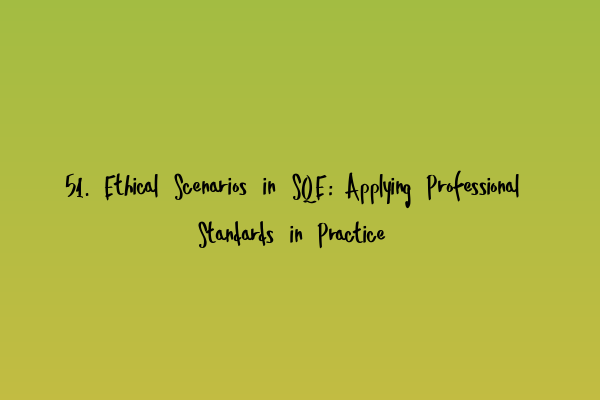51. Ethical Scenarios in SQE: Applying Professional Standards in Practice
As aspiring solicitors, it is crucial to not only possess a sound understanding of legal principles and procedures but also demonstrate a high level of ethical conduct. In the Solicitors Qualifying Exam (SQE), you will encounter a variety of ethical scenarios that will put your knowledge and judgment to the test. This blog post aims to explore ethical scenarios in the SQE and guide you on applying professional standards in practice.
The Importance of Ethical Scenarios
Ethical scenarios in the SQE are designed to assess your ability to identify and address ethical issues that may arise in your legal practice. These scenarios present real-world situations that solicitors encounter regularly, testing your ethical decision-making skills. By demonstrating an understanding of professional ethics and standards, you prove your suitability for the legal profession.
Applying Professional Standards
When faced with ethical scenarios, it is crucial to apply professional standards. The Solicitors Regulation Authority (SRA) provides a Code of Conduct that outlines the ethical obligations solicitors must adhere to. This code is based on principles such as integrity, independence, confidentiality, and professional competence. By aligning your actions with these principles, you can navigate ethical challenges effectively.
1. Integrity: Upholding integrity is the cornerstone of ethical practice. Always act honestly and truthfully, even in challenging situations. Consider the consequences of your actions and ensure that they align with your duty to act in the best interest of your clients and the legal profession as a whole.
2. Independence: As a solicitor, it is crucial to maintain independence in your decision-making process. Avoid conflicts of interest that may compromise your professional judgment. If faced with a conflict, disclose it appropriately and take necessary steps to mitigate its impact on your duty to your client.
3. Confidentiality: Maintaining client confidentiality is a fundamental ethical principle. Respect the privileged nature of the solicitor-client relationship and ensure that you protect sensitive information at all times. Avoid disclosing any information unless legally required or with client consent.
4. Professional Competence: Strive to maintain a high level of professional competence by continuously updating your legal knowledge and skills. When faced with an ethical scenario, rely on your legal knowledge to make informed decisions. Consult relevant statutes, case law, and professional guidance to ensure your actions align with best practices.
Preparing for Ethical Scenarios in the SQE
To excel in ethical scenarios in the SQE, thorough preparation is essential. Here are some steps you can take to enhance your preparation:
1. Understand the SRA Code of Conduct: Familiarize yourself with the SRA Code of Conduct and its underlying principles. Pay close attention to the specific sections that relate to your chosen area of law.
2. Review Case Studies: Access case studies and ethical scenarios that simulate real-life situations. Analyze these scenarios, identify the ethical issues at play, and evaluate potential courses of action. Consider the professional standards that apply and critically assess the consequences of different decisions.
3. Utilize Practice Exams and Mocks: Practice exams and mocks, such as the SQE 1 Practice Exam Questions and SQE 1 Practice Mocks, are invaluable resources for preparing for ethical scenarios. These resources provide an opportunity to apply your knowledge under exam-like conditions, helping you become familiar with the format and the types of ethical scenarios you may encounter.
4. Enroll in Preparation Courses: Preparation courses, such as the SQE 1 Preparation Courses and SQE 2 Preparation Courses, can provide structured guidance and support. These courses offer expert-led tuition, covering essential topics including professional ethics and conduct.
Your Path to Success
By mastering ethical scenarios in the SQE and exemplifying professional standards, you not only enhance your chances of success in the exam but also lay a solid foundation for your future legal career. Remember, ethical practice is not only a requirement for passing the SQE but an ongoing commitment throughout your professional journey.
If you’re looking for more information on SQE exam dates and other related topics, check out our comprehensive guide on SRA SQE Exam Dates. Additionally, for an interactive learning experience, take advantage of the practice exams and mocks available, such as the SQE 1 Practice Exam Questions and SQE 1 Practice Mocks FLK1 FLK2.
In conclusion, ethical scenarios in the SQE provide an opportunity to demonstrate your understanding of professional standards and your ability to navigate complex ethical challenges. By aligning your actions with the SRA Code of Conduct, thoroughly preparing through practice exams and mocks, and enrolling in preparation courses, you can enhance your chances of success and embark on a fulfilling legal career.
